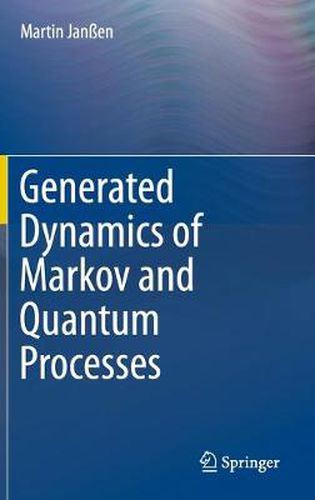Readings Newsletter
Become a Readings Member to make your shopping experience even easier.
Sign in or sign up for free!
You’re not far away from qualifying for FREE standard shipping within Australia
You’ve qualified for FREE standard shipping within Australia
The cart is loading…






This title is printed to order. This book may have been self-published. If so, we cannot guarantee the quality of the content. In the main most books will have gone through the editing process however some may not. We therefore suggest that you be aware of this before ordering this book. If in doubt check either the author or publisher’s details as we are unable to accept any returns unless they are faulty. Please contact us if you have any questions.
This book presents Markov and quantum processes as two sides of a coin called generated stochastic processes. It deals with quantum processes as reversible stochastic processes generated by one-step unitary operators, while Markov processes are irreversible stochastic processes generated by one-step stochastic operators. The characteristic feature of quantum processes are oscillations, interference, lots of stationary states in bounded systems and possible asymptotic stationary scattering states in open systems, while the characteristic feature of Markov processes are relaxations to a single stationary state. Quantum processes apply to systems where all variables, that control reversibility, are taken as relevant variables, while Markov processes emerge when some of those variables cannot be followed and are thus irrelevant for the dynamic description. Their absence renders the dynamic irreversible.
A further aim is to demonstrate that almost any subdiscipline of theoretical physics can conceptually be put into the context of generated stochastic processes. Classical mechanics and classical field theory are deterministic processes which emerge when fluctuations in relevant variables are negligible. Quantum mechanics and quantum field theory consider genuine quantum processes. Equilibrium and non-equilibrium statistics apply to the regime where relaxing Markov processes emerge from quantum processes by omission of a large number of uncontrollable variables. Systems with many variables often self-organize in such a way that only a few slow variables can serve as relevant variables. Symmetries and topological classes are essential in identifying such relevant variables.
The third aim of this book is to provide conceptually general methods of solutions which can serve as starting points to find relevant variables as to apply best-practice approximation methods. Such methods are available through generating functionals.
The potential reader is a graduate student who has heard already a course in quantum theory and equilibrium statistical physics including the mathematics of spectral analysis (eigenvalues, eigenvectors, Fourier and Laplace transformation). The reader should be open for a unifying look on several topics.
$9.00 standard shipping within Australia
FREE standard shipping within Australia for orders over $100.00
Express & International shipping calculated at checkout
This title is printed to order. This book may have been self-published. If so, we cannot guarantee the quality of the content. In the main most books will have gone through the editing process however some may not. We therefore suggest that you be aware of this before ordering this book. If in doubt check either the author or publisher’s details as we are unable to accept any returns unless they are faulty. Please contact us if you have any questions.
This book presents Markov and quantum processes as two sides of a coin called generated stochastic processes. It deals with quantum processes as reversible stochastic processes generated by one-step unitary operators, while Markov processes are irreversible stochastic processes generated by one-step stochastic operators. The characteristic feature of quantum processes are oscillations, interference, lots of stationary states in bounded systems and possible asymptotic stationary scattering states in open systems, while the characteristic feature of Markov processes are relaxations to a single stationary state. Quantum processes apply to systems where all variables, that control reversibility, are taken as relevant variables, while Markov processes emerge when some of those variables cannot be followed and are thus irrelevant for the dynamic description. Their absence renders the dynamic irreversible.
A further aim is to demonstrate that almost any subdiscipline of theoretical physics can conceptually be put into the context of generated stochastic processes. Classical mechanics and classical field theory are deterministic processes which emerge when fluctuations in relevant variables are negligible. Quantum mechanics and quantum field theory consider genuine quantum processes. Equilibrium and non-equilibrium statistics apply to the regime where relaxing Markov processes emerge from quantum processes by omission of a large number of uncontrollable variables. Systems with many variables often self-organize in such a way that only a few slow variables can serve as relevant variables. Symmetries and topological classes are essential in identifying such relevant variables.
The third aim of this book is to provide conceptually general methods of solutions which can serve as starting points to find relevant variables as to apply best-practice approximation methods. Such methods are available through generating functionals.
The potential reader is a graduate student who has heard already a course in quantum theory and equilibrium statistical physics including the mathematics of spectral analysis (eigenvalues, eigenvectors, Fourier and Laplace transformation). The reader should be open for a unifying look on several topics.